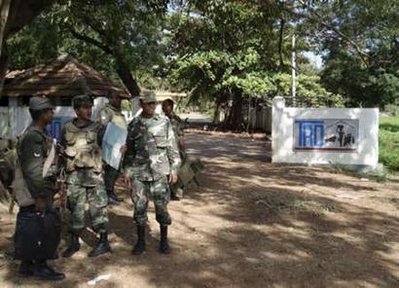Ilankai Tamil Sangam30th Year on the Web Association of Tamils of Sri Lanka in the USA |
|||
 Home Home Archives Archives |
Sri Lanka Faces a Grim New Yearby Jonathan Steele, The Guardian, January 2, 2008
The loss of Kilinochchi, its capital, is a major blow to the Tamil Tiger movement fighting for autonomy in the Sinhalese-dominated country. But the army's success in capturing the town yesterday does not mark the death of the Liberation Tigers of Tamil Eelam (LTTE).
By advancing into the town by land the army has forced any remaining LTTE politicians to withdraw altogether. But the movement's military HQ and its logistical bases are hidden well to the east near its coastal stronghold of Mullaitivu. The whereabouts of the Tiger's ruthless leader, Velupillai Prabhakaran, has never been clear. Seizing Kilinochchi was done at a fearful human cost. Comparisons with Gaza are not amiss, down to the censorship that prevented journalists entering the area while the fighting was underway. Several days of unopposed airstrikes and artillery fire killed civilians as well as Tiger militants, and forced tens of thousands of families to flee into the jungle en masse. Hundreds of troops have died on both sides in the offensive, which has taken months to reach its goal yesterday. Like Gaza too, this is asymmetrical warfare and the Tigers were quick to take the shine off the government's victory yesterday by sending a suicide bomber into the heart of Colombo to kill two airmen at the air force headquarters. This has always been the Tiger tactic in extremis, and they will probably revert to more of it in the aftermath of losing Kilinochchi. Meanwhile, the government hopes to move on to capturing the Elephant Pass, the last Tiger bastion on the road to Jaffna. If it falls, this will make it easier to re-supply the island's second largest town, which at the moment has to get its provisions by sea and air. The army boasts of seizing the ultimate prize, Mullaitivu, later this year. Capturing it would certainly weaken the Tigers severely. But guerrilla movements have the capacity to go underground and reemerge, as long as they remain popular in their own communities. The government calls the LTTE terrorists, and they have been designated as such by the European Union. But the EU also recognises that they speak for many, if not most, Sri Lankan Tamils in denouncing the discrimination that Tamils suffer on the multiethnic and multicultural island. The Tamil diaspora is unlikely to end its funding for the Tigers any time soon. Sri Lanka needs a just political settlement. There is no military solution. Yesterday's army success is producing a triumphalist mood in Colombo, and President Mahinda Rajapakse, who already holds the portfolios of defence, finance and nation-building, has just made himself minister of the media as well – an apparent sign that he wants even tighter control over the country's reporters. Sinhalese politicians will be in no mood for concessions for many months to come. Sri Lanka faces a grim new year. |
||
|
|||
 Kilinochchi was the LTTE's political headquarters, strung out on the main tarmac road from Colombo to Jaffna. The government could always strike it at will by air, as it did just over a year ago when aircraft bombed the offices of SP Thamilselvan, the man with whom foreign diplomats as well as the government had frequently negotiated.
Kilinochchi was the LTTE's political headquarters, strung out on the main tarmac road from Colombo to Jaffna. The government could always strike it at will by air, as it did just over a year ago when aircraft bombed the offices of SP Thamilselvan, the man with whom foreign diplomats as well as the government had frequently negotiated.